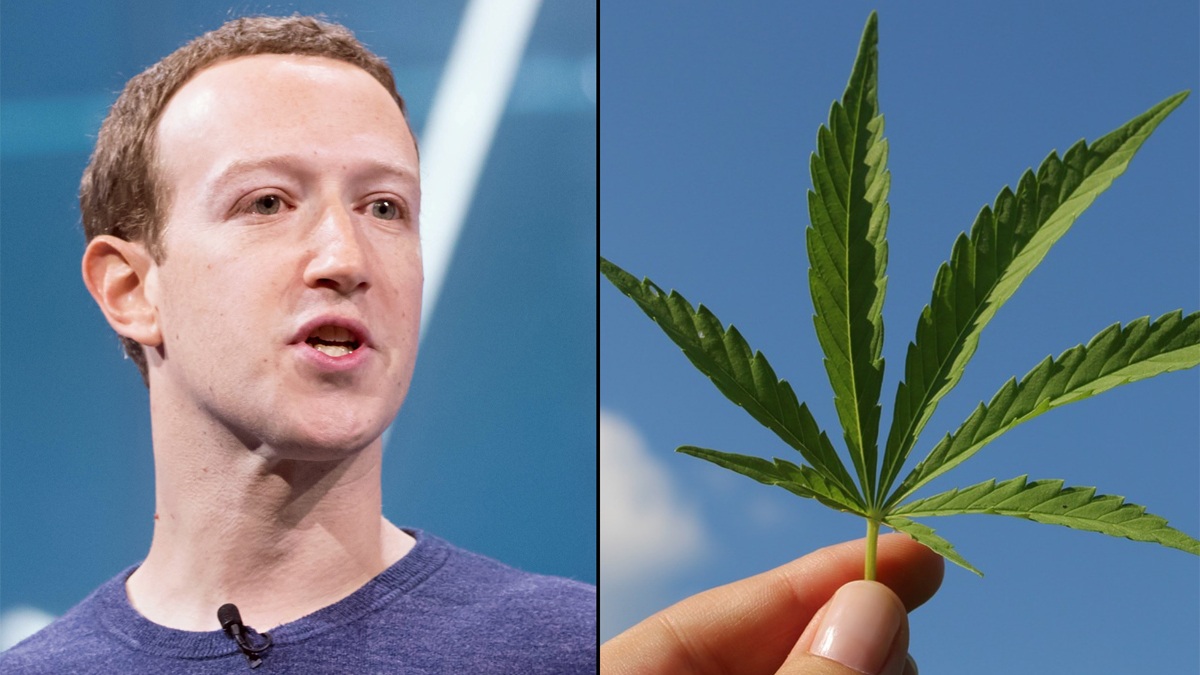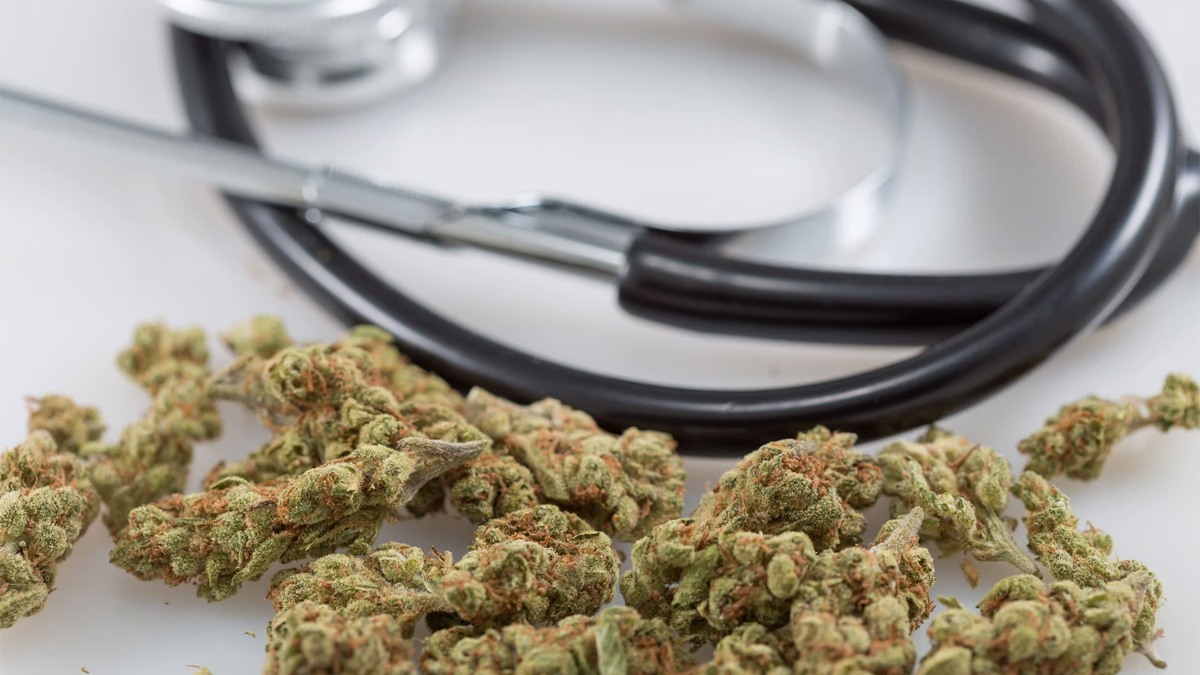
Image element courtesy of Anthony Quintano.
Despite new changes to content moderation announced earlier this week, Meta—the owner of Facebook, Instagram and Threads—appears not to be changing its practices around marijuana, continuing to block search results on the social media platform for terms such as “marijuana” and “cannabis” and instead displaying a notice encouraging users to report “the sale of drugs.”
Facebook founder Mark Zuckerberg announced a number of changes to content policies and moderation on Tuesday, such as stepping away from practices like third-party fact checking in favor of a community notes model, in which users are responsible for flagging questionable content. The company said it’s also “getting rid of a number of restrictions on topics like immigration, gender identity and gender that are the subject of frequent political discourse and debate.”
“We will allow more speech by lifting restrictions on some topics that are part of mainstream discourse,” the company said as part of the announcement, “and focusing our enforcement on illegal and high-severity violations.”
“Up until now, we have been using automated systems to scan for all policy violations, but this has resulted in too many mistakes and too much content being censored that shouldn’t have been,” the company added.
To many in the cannabis space—including some medical marijuana patients, cannabis content creators, news outlets and even government agencies—that feels like an apt description of how they’ve have been treated by the company, which has historically removed or limited the visibility of marijuana-related accounts.
But the new changes—touted under the banner of “free expression”—don’t appear to affect the handling of cannabis on Meta’s platforms.
Neither Facebook nor Meta replied to Marijuana Moment’s request for clarifications on the new policies this week, but the only mention of drugs in the new announcement is the company’s stated intent to “continue to focus” its content moderation systems “on tackling illegal and high-severity violations, like terrorism, drugs, fraud and scams.”
“For less severe policy violations, we’re going to rely on someone reporting an issue before we take action,” it says.
It’s unclear exactly when all the changes will be deployed. Facebook said it would implement the use of community notes “over the next couple of months, and will continue to improve it over the course of the year.” It didn’t provide a timeframe for changes to content moderation policies.
As of this week, however, the platform still censors all searches involving the words “marijuana” or “cannabis”—even when searching for accounts that merely regulate state-legal marijuana, engage in political advocacy or simply report news related to the issue. A query for “Massachusetts Cannabis Control Commission,” “Marijuana Policy Project,” or “Marijuana Moment,” for example, yields no results and instead displays a notice encouraging users: “If you see the sale of drugs, please report it.”
While many platforms have policies against the illegal sale of drugs or require age-gating for content around controlled substances, critics say Meta’s filtering often catches content focused on education, political advocacy and public health.
Reached this week, a spokesperson for the Massachusetts Cannabis Control Commission confirmed that the commission “has experienced challenges with some of its content appearing on social media channels, as have many licensed businesses.”
“Shadow bans and other restrictive measures make it challenging for stakeholders to search for our government agency,” the spokesperson said in a statement, “and can inhibit legitimate, timely messages from reaching members of the public.”
The statement called social media “a valuable tool for the Commission to communicate critical announcements to licensees and state residents, to increase education about responsible cannabis use and youth prevention through our ‘More About Marijuana’ campaign, and to promote new social equity programming opportunities.”
Brian “Box” Brown, an editorial cartoonist whose work includes the nonfiction comic strip Legalization Nation, said Meta’s policies around marijuana have also limited access to his comics.
“From my perspective,” he told Marijuana Moment in an email, “no change has been made in Meta’s attitude towards cannabis, and it’s just lumped in with ‘drugs.’”
After being on Instagram for years, he said he started posting “pretty exclusively cannabis content” about four years ago. He didn’t run into any trouble until recently.
“About 4 to 5 months ago, all my posts started getting flagged and deboosted,” Brown said, “and it killed my reach and growth.”
“My mind was boggled,” he continued. “My comic strip thats frankly TOO wonky about policy is getting flagged for selling drugs.”
He signed up for a verified account on Instagram because he heard it would allow him to contact the company more easily.
“I was able to get actual customer service,” Brown explained, “but after many hours of dealing with their impossible to use chat window, I found out that stuff gets flagged for using cannabis related words even if it’s not violating any rules, and then it automatically stops being promoted and no one sees it. Then you have to go in and appeal those changes which fixes the problem… briefly.”
“Eventually all those same posts get flagged again for the same reason,” he added, “and you have to appeal again. Maybe futilely, I started censoring any weed related words in my comic strips, but all kinds of ancillary words like ‘vape’ and ‘hemp’ are also flagged.”
At the moment, Brown has given up on the constant appeals. “My last 18 strips have been de-boosted,” he said on Wednesday. “My follower count also stopped moving at all. After this new announcement, I went back and appealed everything and my account was back to normal…briefly…then this week’s comic was flagged twice.”
The cartoonist did adjust the settings on his account to mark it for audiences 18 and older, but he said that change has been so recent that he hasn’t been able to tell if it’s helped or not.
Ahead of this past holiday season, vape device manufacturer Puffco similarly complained about Instagram and parent company Meta for what it described as an overly aggressive campaign to flag and remove cannabis-related content. A video from the company asserted that Instagram’s policing of cannabis posts by brands and individuals effectively stifles efforts at community building among veterans, medical marijuana patients and legal adult-use consumers.
“The world didn’t want us, so we made a safe space for our community on Instagram where we could just be ourselves and share what we love,” the video said. “Isn’t that the point of this place?”
Morgan Fox, political director for the advocacy group NORML, told Marijuana Moment this week that Facebook had in the past limited the reach of Marijuana Policy Project, where he previously worked, but for a while “it seemed as if that issue had been dealt with.”
Fox called it “incredibly disappointing” that accounts are dealing with ongoing restrictions today.
“The algorithms that are in charge of this, and the restrictions placed on the search terms, are still preventing advocates from being able to get exposure to the general public and the huge number of people that use these services,” he said.
Despite more and more states having legalized and regulated marijuana for adults, social media companies have regularly flagged cannabis-related content as violations of their terms of service. The practice has led to suspensions of accounts belonging to state-regulated cannabis brands, informational websites and individual content creators, who now often create backup accounts to avoid the loss of a key line of communication to thousands of followers.
In 2018, concerns arose that Facebook was “shadowbanning” marijuana pages, including those of state cannabis regulatory agencies, by blocking them from search results. An internal presentation at the company the next year noted that it was considering loosening cannabis restrictions, but many have continued to run into problems.
In July 2023, Meta announced that it had updated its cannabis advertising policy to permit the promotion of some non-ingestible CBD products and also loosen restrictions on hemp ads. It said businesses could begin promoting the sale of CBD if they receive written approval from Meta and if the products are certified with the payment compliance company Legitscript and comply with local laws. Ads also could not target people under 18.
“We want people to continue to discover and learn about new products and services on our technologies,” Meta said. However, it added that “advertisers will continue to be prohibited from running ads that promote THC products or cannabis products containing related psychoactive components.”
Earlier that year, Meta faced criticism over a feature of its microblogging app, Threads, for prompting users with a “get help” message about federal substance misuse resources if they searched for “marijuana,” various psychedelics and other controlled substances. Meanwhile, alcohol- and tobacco-related searches were exempt from the prompt. The feature no longer appears to be in place.
Twitter, now known as X, had a similar practice in place in 2020, cautioning users about “marijuana” searches as part of a partnership with SAMHSA. Alcohol and tobacco were excluded from the search restriction. But in late 2022, after being acquired by Elon Musk, Twitter suspended that practice.
Also, Twitter since updated its cannabis advertising policy, aiming to give cannabis businesses that are “certified advertisers” the ability to feature “packaged” cannabis products in the ad creative that’s promoted on the social media site.
Google, for its part, updated its policy in January 2023, making it so companies can promote Food and Drug Administration- (FDA) approved drugs containing CBD, as well as topical CBD products with no more than 0.3 percent THC.
Video game streaming company Twitch, meanwhile, updated its branding policy for streamers, prohibiting promotions of marijuana businesses and products while explicitly allowing alcohol partnerships. Twitch had previously clarified rules in a way that was inclusive of cannabis—exempting marijuana-related references from the list of banned usernames, just as it does for alcohol and tobacco.
In an update to Apple’s iPhone software that was instituted in 2022, users were given an option to track medications and learn about possible drug interactions with other substances—including marijuana.
In 2021, Apple ended its policy of restricting cannabis companies from conducting business on its App store. The marijuana delivery service Eaze subsequently announced that consumers were able to shop and pay for products on its iPhone app for the first time.
In contrast to Apple, Google’s Android app hub updated its policy in 2019 to explicitly prohibit programs that connect users with cannabis, no matter whether it is legal in the jurisdiction where the user lives.
In 2022, New York marijuana regulators asked the social media app TikTok to end its ban on advertising that involves the word “cannabis” as they worked to promote public education on the state’s move to legalize.
Keep out of reach of children. For use only by adults 21 years of age and older.










